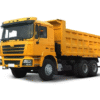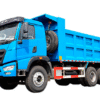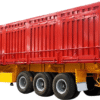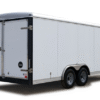If I’m near a construction site or a landscaping project, I notice people use two main ways to move and dump materials: Dump trucks and dump trailers. Based on my experience, they might look similar when you first see them. However, how they function and the best situations to use each one can really impact your work. I believe understanding this choice is key for your job. You might feel the differences are obvious. I’ve found many do. But, in my view, there’s often one important point most people don’t consider…
Definition and Basic Structure
Dump Trucks and dump trailers both move loose materials like gravel, sand, dirt, or debris. I find their designs and uses have some key differences.
What Is a Dump Truck?
From my experience, a dump truck is a powerful vehicle that drives itself. It has a cab, a chassis, and an open-box bed. This bed uses a hydraulic system to lift from the front. This way, it can dump materials out the back. I’ve noticed it’s a complete unit. You just need a skilled driver. This driver often needs a commercial driver’s license (CDL). I see dump trucks built for big hauling jobs. You’ll find them in construction, mining, and demolition industries.
Key Features of Dump Trucks
Propulsion: I understand it has its own engine, cab, and chassis. So, you don’t need another vehicle to tow it.
Hydraulic System: The Truck itself powers its integrated hydraulic system.
Payload Capacity: It can carry a lot. I mean, several tons of materials in one go.
Licensing: To operate one, a CDL is often required. This is something I always check.
Usage: You see them a lot on large worksites. They are great for moving bulk materials.
What Is a Dump Trailer?
Now, a dump trailer doesn’t have its own motor. I’ve seen it designed to be pulled by another vehicle, like a pickup truck or a semi-tractor. To dump its load, it uses a hydraulic lift. I’ve learned this lift gets power from the tow vehicle or a separate power source. I’ve found that dump trailers come in many types. These include end dump, side dump, and bottom dump (which some call belly dump). There are also roll-off, deck-over, compact, and light-commercial models.
Example Dump Trailer Models
- 10SR Pro Series Tandem Axle: This one is 12 feet long and 83 inches wide. It has a gross vehicle weight rating (GVWR) of 9,990 lbs. I note its cargo capacity is 6,660 lbs.
- 70SR Tandem Axle: This model measures 10 feet long and 60 inches wide. Its GVWR is 7,000 lbs. I see its cargo capacity is 5,270 lbs.
Key Features of Dump Trailers
Propulsion: You need to tow it. It doesn’t have its own engine or cab, in my observation.
Hydraulic System: The towing vehicle or other systems power its hydraulics.
Payload Capacity: This can vary quite a bit. I find it’s usually less than what dump trucks carry. It really depends on the trailer model and the tow vehicle.
Licensing: For smaller models, a regular driver’s license is often enough. However, I always recommend checking local and state rules.
Usage: I think these are perfect for jobs needing flexibility. For instance, hauling materials for home building, landscaping, or moving things between different sites.
Comparison Table: Basic Structure
Types and Configurations
- Dump Truck Types: From what I know, types include standard dump, articulated, transfer, and super dump.
- Dump Trailer Types: For dump trailers, I’m aware of types like end dump, side dump, bottom dump (or belly dump), and roll-off. There are also deck-over, commercial-grade, and light-commercial versions.
So, to sum it up from my perspective: Dump trucks are strong, complete vehicles for big projects. Dump trailers, on the other hand, give you more flexibility for medium and smaller hauling tasks. What you choose depends on the job and your towing setup.
Cost Considerations: Dump Truck vs Dump Trailer
If you’re choosing between a DUMP TRUCK and a dump trailer, I think it’s important to consider all the costs. Don’t just look at the initial price tag. From my experience, comparing their cost factors has taught me a few things:
| Category | Details |
|---|---|
| Initial Purchase Cost |
|
| Operating Expenses |
|
| Value Retention |
|
| Additional Cost Factors |
|
| Cost-Efficiency and Use Case |
|
Operational Characteristics: How Dump Trucks and Dump Trailers Work on the Job
Loading Process
Dump trucks are independent vehicles. They are ready to load and go as soon as material is in the bed.Dump trailers need a towing vehicle. You must attach it before you get to the loading site.Both types take loose materials into their beds for loading. I find that dump trailers often have a lower bed height. This makes loading quicker and simpler, which is a real help if you have a small crew or work alone.
Unloading Mechanism & Efficiency
Both dump trucks and dump trailers use hydraulic lifts. This is how they unload materials at the job site.In a dump truck, the truck’s own system powers the hydraulics. For a dump trailer, the tow vehicle or a separate unit powers the hydraulics.From my experience, dump trailers offer an edge in efficiency. Their lower height makes them easier to unload by hand. I think this is quite useful for specific tasks.
Mobility, Maneuverability, and Site Access
I’ve seen that dump trucks move better, particularly in tight job sites. This is because they are a single, self-propelled unit.Dump trailers are trickier to move around. Their overall length and the need to work with a tow vehicle mean they require more space to turn and position.A plus for dump trailers: they are lighter. I’ve found you can tow them over sensitive ground, like lawns or walkways. There’s less risk of damage compared to a heavy dump truck.If space is really tight, I’d suggest a dump truck for easier movement.
Versatility and Workflow Flexibility
I like how dump trailers add flexibility. Once you detach it, the towing vehicle is free for other uses. The trailer stays onsite.A crew can load the dump trailer in one spot. Then, they can use the towing vehicle to transport other tools. I believe this really improves the workflow.Dump trucks, on the other hand, handle one task at a time: transporting and dumping materials.
Labor and Productivity Benefits
I’ve noticed dump trailers reduce manual work. Their hydraulic unloading is complete. This protects crew energy and I think it increases total productivity for the day.With a dump trailer, you can drop off material. The crew can then unload it over time. This is harder with a dump truck, which usually needs to move elsewhere after it dumps its load.
Practical Applications and Use Cases
I recommend dump trucks for Heavy-Duty jobs. They are also best for large-scale material hauls.Dump trailers are great for smaller projects. Think residential or landscaping jobs that need more flexibility. Their ability to access tricky or narrow spaces is a big benefit.If you’re working on delicate terrain, a dump trailer is a good choice. It’s also useful if your towing vehicle already handles multiple roles. I find this offers extra utility.
Fuel and Operating Cost Efficiency
- In terms of fuel, I find dump trailers to be more efficient. They use a tow vehicle, sharing engine use. This reduces the need for separate fuel.
- Dump trucks need their engines to run throughout the job. This contributes to the total operating costs.
Terrain and Impact: Dump Truck and Dump Trailer Performance on Various Ground
I find that dump trucks and dump trailers handle job sites in distinct ways. Your choice influences your equipment’s performance. It also impacts the safety of delivering or unloading materials.
Dump Truck Terrain Advantages
In my experience, dump trucks are better for rough, uneven, or muddy ground. They feature a low wheelbase and dedicated drive wheels. This design allows them to power through rocky paths and climb steep slopes. They also manage unpredictable construction zones effectively. You’ll often see dump trucks on mining sites because they maneuver so well. They are also frequently used for land clearing projects and in remote areas that are tough to access. From what I’ve seen, dump trucks handle bumps and slopes with greater ease, making them my top recommendation for off-road jobs.
Terrain Limits of Dump Trailers
I’ve noticed dump trailers work best on stable, firm surfaces. They don’t have their own drive wheels. So, they depend on the towing vehicle to move. This means they are not as good on soft ground or sandy sites. They also struggle with steep banks. I’d say a dump trailer is a good choice if you move materials on paved roads. This also applies to parking lots or hard-packed construction sites. However, on unstable ground, their performance isn’t great. There’s also a higher chance of them getting stuck.
Unloading Safety and Stability
From my perspective, a key difference is how they unload on uneven ground. Dump trailers, particularly end dump types, can become unstable. This happens if the ground is slanted or not firm. They might tip if the load shifts or is not balanced. I find side dump trailers a bit safer on uneven ground. They release materials fast, reducing rollover risk. Still, I recommend traditional dump trucks if you cannot find a flat spot to unload. They are my preferred choice in such situations.
Real-World Use Cases
- I suggest using a dump truck if your job involves clearing brush on steep hills. It’s also better for hauling dirt from a muddy pit. I consider it the safer option.
- I think a dump trailer is simpler and more cost-effective for landscaping jobs. This is true if you make regular trips on city streets. Or if you’re hauling mulch between houses in a neighborhood.
- In my experience, using a dump trailer on unpredictable terrain often leads to more trouble and delays.
Quick Summary
Based on what I’ve seen: – Dump Trucks: I find they manage rugged, uneven, or muddy off-road sites well. They are easy to maneuver and less likely to get stuck. – Dump Trailers: In my opinion, these are best for asphalt or gravel lots. They also suit level ground where you can tow and unload safely and stably. – Watch Outs: I advise you to avoid slanted or unstable surfaces when dumping from trailers. Always balance loads to stop rollovers or tip-overs. This is particularly important on hills or loose dirt.
I believe your choice between the two depends on the surfaces you will cross. It also depends on how much room for error your project has. For challenging terrain, I’d say professionals prefer dump trucks. For regular roads or lighter jobs, I find dump trailers offer good practical value.
Versatility and Efficiency: Dump Truck vs Dump Trailer
If I’m picking between a dump truck and a dump trailer, I think about how versatile and efficient they are. These points really change how my projects can adapt and how my daily work flows.
Flexibility and Multi-Tasking Use
For me, dump trailers offer great flexibility. I can tow them, detach the trailer at a job site, and then use my truck for other jobs. This lets my crew keep loading or unloading materials. Meanwhile, my truck is free for more hauling or other tasks. If my needs change, I find it easy to get a bigger or smaller trailer. I don’t have to replace the whole truck. Dump trucks, however, are fixed units. Their bed is attached, so I’m stuck with the capacity and function of that one truck.
Maneuverability and Site Accessibility
From my experience, dump trucks are great for getting around, particularly on small or busy job sites. They move as one piece. So, I find it simpler to get through tight spots, narrow roads, or small lots with them. Dump trailers, on the other hand, the longer ones in particular, need more room to turn and park. This might make them less suitable for small sites. I think they are better when I need to drop off the trailer and want on-site flexibility.
Maintenance and Cost Efficiency
I find that maintaining a tow vehicle and a separate dump trailer is simpler. It’s also more cost-effective than handling the engine, hydraulic systems, and specialized parts of a full dump truck. In my experience, trailer maintenance costs stay lower over time. Dump trailers also tend to hold their value well if I decide to sell them used. I have observed that dump trucks depreciate faster because of engine wear and various regulatory requirements.
Labor-Saving Design and Loading Height
In my experience, dump trailers offer a lower load height. This makes them easier for me to fill, particularly if I am working solo or with a small crew, which saves us time and physical effort. Hydraulic lifts enable efficient dumping. This further reduces the manual labor I need for unloading. Dump trucks are powerful, but I find they often have higher loading and unloading positions. This can slow down my crews or make solo work difficult.
Regulatory and Licensing Requirements
From my experience, operating a dump truck often requires a commercial driver’s license (CDL). I also need to comply with stricter regulations, which adds to my time and expenses. In contrast, I can tow many dump trailers with a regular driver’s license, particularly the lighter models. I believe this makes it easier for small contractors and businesses to get started.
So, in my opinion, if I am looking for maximum flexibility, good cost control, and efficiency for various small to mid-sized jobs, I recommend a dump trailer because it offers more advantages. If my work often means moving through tight spaces or I need the absolute highest hauling capacity, then a dump truck certainly has its place. I just keep in mind that it comes with more maintenance and regulatory demands.
How People Use Dump Trucks and Dump Trailers
If you’re picking between a dump truck and a dump trailer, I think you should look at what your job really needs. Let me show you how people often use each one in different industries and for various projects.
My Take on Dump Truck Uses
Construction Projects: Dump trucks are great for big building sites. They move heavy stuff like gravel, sand, dirt, and large demolition trash. They can carry a lot—often 10–20+ cubic yards. This means fewer trips for big amounts of material. I find this saves time and work on large construction jobs.
Roadwork and Infrastructure: For paving and road building, these trucks do a lot of the heavy lifting, in my experience. They haul asphalt and base materials. Their strong construction means they can handle rough job sites without a problem. This makes them dependable for tough city and highway work.
Mining and Quarrying: In tough places like mines, dump trucks move rock and ores over uneven terrain. You’ll often see off-highway models here. I’ve seen they are good at climbing steep hills and carrying very heavy loads. They don’t get stuck or damaged easily.
Landfill and Waste Transport: They move waste to landfills in many heavy trips. Their strong frames hold up well to this tough, day-to-day work. I believe this shows their durability.
Why I Recommend Dump Trailers for Certain Jobs
Landscaping and Residential Jobs: I often see landscape teams pick dump trailers. They use them for mulch, soil, pretty rocks, and yard waste. Trailers are lighter than trucks. So, they can get into small backyards, city properties, and delicate areas. They usually don’t make ruts or cause damage, which is a big plus in my book.
Small-Scale Construction: If a big truck is overkill, homeowners and independent contractors often use dump trailers for supplies. I’ve noticed this trend. These trailers are good for smaller loads. Think 4–14 cubic yards each trip. From my perspective, models like live-bottom or side-dump trailers give you more options for special jobs.
Precision Road Maintenance: For careful road work, I see people use special dump trailers, like those that dump from underneath or cross-gate types. They spread gravel smoothly on roads. This is key for road repairs, building roads in the countryside, or fixing up parking lots. It’s very useful when you need to place materials just right.
Agriculture and Farm Use: Farmers find trailers useful for moving feed, grain, fertilizer, or animal bedding. I think this is a smart choice for them. Live-bottom trailers have a gentle unloading system. This helps keep delicate products safe. It also makes it simpler to clean out the trailer after a load.
A Look at Special Trailer Types I Know
Side Dump Trailers: I find these are good when you need to dump things fast and keep stable, like on bumpy ground.
Trailers Dumping from Underneath: These help you lay gravel or asphalt in a neat line on roads. This makes grading and spreading smooth and exact. I recommend them for this.
Live Bottom Trailers: I see these in farming and landscaping. They unload gently and control the flow. They’re great for delicate things like bulk grain or compost.
What I See as Key Benefits
Dump Trucks:
- They hold the most for big jobs.
- You can use them right away; no towing vehicle needed.
- I think they are built for tough, off-road spots.
Dump Trailers:
- You can tow them with different vehicles, which I find very flexible.
- They are gentler on the ground and can get into tight or sensitive spots.
- I believe they are a good value for small to medium jobs.
- You can find special trailers for specific needs.
Real-World Examples from My Viewpoint
- Home Renovation Sites: For home renovations, I think dump trailers are excellent. They are simple to move around. They are also less apt to harm driveways or garden areas.
- Large Earthmoving or Mining: For big earthmoving or mining jobs, dump trucks are what I usually see. They move huge amounts quickly. This saves on work and uses equipment well.
- Rural Road Building: When building roads in rural areas, trailers designed for bottom discharge spread gravel over long road stretches very effectively. I’m impressed by how they do this.
I hope these examples show that dump trucks and dump trailers each have their own special uses. My advice is to think about your project’s needs. Also consider the space at your site. And, of course, what kind of material you are moving. This will help you pick the right equipment.
summary
I’ve weighed all these differences. I’ve learned that when I choose between a dump truck and a dump trailer, it’s not just about how much it costs or its capacity. For me, it’s really about picking the right tool for my specific jobs. I’ve found this true whether I’m on a massive construction site or just landscaping my backyard. Grasping these differences has definitely helped me make smarter decisions. I truly think the best equipment is what suits my job, the ground I’ll be on, and my budget. When I consider all these points, I can find the perfect hauling setup. This makes my work go smoothly, and I enjoy it more.
FAQS
1. What is the main difference between a dump truck and a dump trailer?
A dump truck is a single, self-contained vehicle with a hydraulic lift system to unload materials. A dump trailer is an unpowered unit towed by a truck or SUV, requiring the towing vehicle to operate its hydraulic dumping mechanism.
2. Which has a higher load capacity: a dump truck or a dump trailer?
Dump trucks generally have a higher capacity (up to 30+ tons for heavy-duty models), while dump trailers typically max out around 10–15 tons. However, some commercial-grade dump trailers can rival smaller dump trucks.
3. Are dump trailers more maneuverable than dump trucks?
Yes, dump trailers are often easier to maneuver in tight spaces because they can be detached, allowing the towing vehicle to navigate separately. Dump trucks, being larger, may require more space for turning and dumping.
4. Which is better for occasional use: a dump truck or a dump trailer?
A dump trailer is usually more cost-effective for occasional users (e.g., homeowners, landscapers) since it doesn’t require a dedicated vehicle. Dump trucks are better suited for daily heavy-duty jobs (e.g., construction, mining).
5. Can a dump trailer be used with any towing vehicle?
No—dump trailers require a properly rated tow vehicle (check payload and towing capacity). Light-duty trailers may work with pickups, but larger models need heavy-duty trucks (e.g., 1-ton or dual-rear-wheel trucks).








